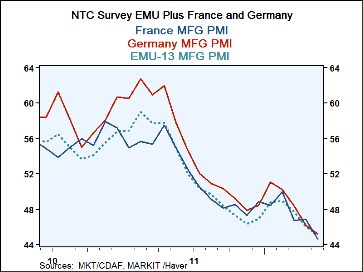 Global| Jun 01 2012
Global| Jun 01 2012Markit MFG PMI Index Weaken
Summary
The table above focuses on changes in the PMI indices for a number of key EMU and EU members. In May only Italy, Greece and Ireland did not register drops in their respective MFG PMI gauges. Over three months the EMU MFG PMI is lower [...]
 The table above focuses on changes in the PMI indices for a number of key EMU and EU members. In May only Italy,
Greece and Ireland did not register drops in their respective MFG PMI gauges. Over three months the EMU MFG PMI
is lower by 3.83 points; only Greece and Ireland are higher over three months.
The table above focuses on changes in the PMI indices for a number of key EMU and EU members. In May only Italy,
Greece and Ireland did not register drops in their respective MFG PMI gauges. Over three months the EMU MFG PMI
is lower by 3.83 points; only Greece and Ireland are higher over three months.
Over the past year Germany and France are off the most with indices that have fallen by 12.54 and 10.28 points, respectively. This is a pretty clear way to make the point that the rest of Europe is dragging the core down. Of course, much of the rest of EMU is already much weaker than these countries but the weakness is spreading to the core the strength from the core is not spreading to the periphery.
We can also look at performance relative to this cycle’s peaks and troughs. Germany, Spain and Italy have fallen the most from their respective cycle peaks. Ireland has fallen the least dropping by only 5.5 points from its cycle peak.
Ireland and Austria are up the most from their respective cycle troughs, followed by Spain, Germany and the Netherlands. Greece’s three month gain of 5.4 points coincides with its rise from its trough. So while Greece MFG is rising over two-months it is rising from its worst reading of the cycle.
Positioned in their historic queue of values we find Ireland as the strongest in the 48th percentile of its historic queue of PMI values followed by Austria in its 29th percentile and The Netherlands in the 19th percentile. The remaining EMU members are all at or below their respective 11th percentiles. The UK, an EU member, is relatively well-off in the 44th percentile of this queue.
Only Ireland and Austria have raw PMI gauges that are in the 50th percentile or higher. Spain with a reading of 41 is the weakest raw observation followed by Greece at 43.
These readings clearly show a region in distress. The steady fall off for Germany and France shows that the core countries of EMU are gradually being ground down by the crisis. There is little in the way of hope in these data except to note that Austria and Ireland are finding their way. But Ireland has been working its way out from under a pile of debt.
This is a situation that has grown to feed on itself. Germany has not used its size and economic strength to serve as an engine of growth. Instead it has played defense and that has resulted in it being dragged into the slowdown. At some point Europe would seem to need a common game plan instead of 17 separate plans. If Europe really wants to be a common Zone why not act like one?
12 Apr
12 Mar
12 3Mo 6Mo 12Mo Frm
Peak Frm
Low %of Q May
12
Robert Brusca
AuthorMore in Author Profile »Robert A. Brusca is Chief Economist of Fact and Opinion Economics, a consulting firm he founded in Manhattan. He has been an economist on Wall Street for over 25 years. He has visited central banking and large institutional clients in over 30 countries in his career as an economist. Mr. Brusca was a Divisional Research Chief at the Federal Reserve Bank of NY (Chief of the International Financial markets Division), a Fed Watcher at Irving Trust and Chief Economist at Nikko Securities International. He is widely quoted and appears in various media. Mr. Brusca holds an MA and Ph.D. in economics from Michigan State University and a BA in Economics from the University of Michigan. His research pursues his strong interests in non aligned policy economics as well as international economics. FAO Economics’ research targets investors to assist them in making better investment decisions in stocks, bonds and in a variety of international assets. The company does not manage money and has no conflicts in giving economic advice.






